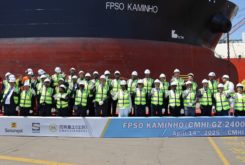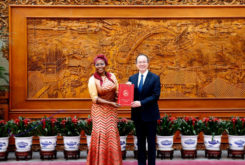Sonangol, the national oil company of Angola, is close to sales of assets that should earn it billions of dollars and enable it to reduce its heavy debts and invest more in the oil sector, the engine of Angola’s economy.
One of the most important sales is privatisation of assets of Sonangol Pesquisa & Produção. This firm has become one of the biggest burdens of the group due to its chronic mismanagement. The sales will involve interests in about 20 offshore blocks and earn nearly US$3 billion; this money is essential to the company’s reorganisation and reform of the country’s oil sector.
Closure of one major deal is due soon. According to our sources, negotiations are at an advanced stage for sale by the Sonangol group (SNL EP) of its 30% stake in Block 32; this is operated by Total and Sonangol Sinopec International 32 Limited is the third biggest shareholder. The sale should generate more than US$2 billion and even as much as US$3 billion. But Sonangol owes US$1 billion to the group that is developing Block 32. So the net cash gain from the sales is expected to be US$1-2 billion.
Block 32 is the largest offshore development in Angola and requires investment of about US$16 billion in the coming years. Of that, Sonangol was supposed to provide more than US$5 billion, according to its shareholding. But the financial weakness of the company is so severe that it cannot make such an investment. So its membership of the group has become an obstacle to the project.
Total, the operator of the block, holds a 30% stake. The other partners are SNL P & P (30%), Sonangol Sinopec International 32 Limited (20%), Esso Exploration & Production Angola (Overseas) Limited (15%) and Portuguese company Galp Energia (5%).
In July 2018, the group started production of the “Kaombo” project, through the FPSO platform that will develop the “Kaombo Norte” area. The Kaombo development plan provides for the installation of two FPSO units, each with an estimated production of 115,000 barrels of oil per day. The second unit, in the Kaombo South area, is due to start operations during 2019.
The units will be connected to 59 submerged wells; they are designed to develop resources in six discoveries in the central and southern part of Block 32 — “Gengibre” , “Gindungo”, “Caril”, “Canela”, “Mostarda” and “Louro”. The official estimate of the total volume to be recovered from the fields is about 650 million barrels of oil.
According to our sources, a second major deal is also close — Sonangol will sell a stake in Blocks 20 and 21. This could generate income of as much as US$1.5 billion.
The sale of this stake has a complicated background. Since last August, Sonangol has been prolonging the deadline for the negotiations.
They required two executive decrees by the country’s oil minister, which authorised Sonangol to take over stakes in the project held by Cobalt, a U.S. firm. He signed them on January 02, 2019; they were published on January 16, 2019, taking effect that day. The decrees also prolonged the development period of Block 20 for six years and that of Block 21 by five years. Official figures put the reserves in the two blocks at 1.3 billion barrels of oil and 4.75 trillion cubic feet of gas; industry sources consider the numbers exaggerated.
After his appointment as Sonangol CEO in late 2017, Carlos Saturnino made a priority of settling a dispute with U.S. oil company Cobalt; his predecessor had pulled back from an earlier deal to buy the two blocks for US$1.75 billion. In December 2017, the two companies reached an amicable agreement to end the legal dispute. Under this, the Angolan company paid US$500 million for rights in the two oil blocks. The first tranche of US$150 million was to be paid before February 23, 2018 and the remaining US$350 million before July 01, 2018.
In June 2018, during a period of financial stress and lack of liquidity at Sonangol, Saturnino announced that it had already repaid the entire sum agreed with Cobalt ahead of the July deadline. With these payments, Sonangol became 100% owner of the 21/09 block after taking over the 40% owned by Cobalt; it also became 70% owner of block 20/11, after taking over the 40% from Cobalt. The other 30% is owned by BP. (end)



